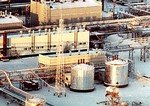 In the wake of the unsatisfactory summit with Russia, the Commission and the EU foreign policy High Panjandrum, Javier Solana, have, according to EUObserver, come up with a paper, entitled: “An external policy to serve Europe’s energy interests”.
In the wake of the unsatisfactory summit with Russia, the Commission and the EU foreign policy High Panjandrum, Javier Solana, have, according to EUObserver, come up with a paper, entitled: “An external policy to serve Europe’s energy interests”.The paper will be discussed at the next European Council on June 15 – 16 but its essence appears clear. Well, clear as mud.
On the one hand, we want to have a new deal with Russia as
“…part of a general revamp of political ties with the Russians, with the current Partnership and Cooperation Agreement between Brussels and Moscow open for re-negotiation from 2007 onwards”.On the other hand we are a little worried about the fact that Russia supplies a quarter of the EU’s gas and oil and is not necessarily the most reliable of suppliers as witnessed by Gazprom’s antics with Ukraine and Moldova at the beginning of the year and recent threats, since rescinded, of selling energy products to China as an alternative to Europe.
The paper proposes that the EU
“works towards a comprehensive agreement with Russia covering all energy products”.Interestingly enough, it seems to have dawned on the High Panjandrum and his colleagues that the buyers of energy can have as much if not more influence on the sellers of it as the other way round. After all, Russia has to sell that gas to somebody, as that famous economic growth (on with President Putin cast some doubt in his state of the nation address) depends on it.
So, there appear to be proposals to diversify energy sourcing:
"There are a number of new gas projects which have either been decided or are in an advanced stage of planning (North Africa, Middle East, Caspian region, Russia and Norway)," the paper reads.Well, indeed. They are of some importance to the countries of the region, as well, since they would like to be able to become more independent of Russia. Turkey, through whose territory projected pipelines would pass is also interested and then there is Algeria, ready to sell energy to European countries if the necessary work is done.
The document characterises the development oil pipelines from the Caspian region and Central Asia directly to the EU as "vital."
If the report is correct, the paper includes some veiled threats to Russia – that summit must have been really "frank and open":
The officials also highlighted that the Russians need "enormous amounts of investment" to modernise and expand its energy infrastructure.Beyond that, the paper seems carefully anxious not to say anything divisive. There is little discussion of any possibility of an EU energy policy or, even, any new “instruments” to provide early warning of an external crisis.
"They not only need capital, they also need technology," suggesting EU firms could provide Russia with the necessary know-how if the Kremlin granted equal market access to EU companies.
The policy paper also stresses the need for "diversifying geographical origin and transit routes", promoting energy supply routes which largely bypass Russia.”
And talking of alternatives, what of nuclear power? No mention of it. Too divisive.
COMMENT THREAD
No comments:
Post a Comment
Note: only a member of this blog may post a comment.